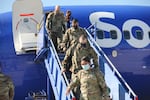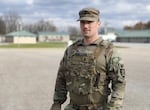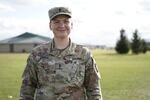
Members of the Oregon National Guard arrive at Camp Atterbury in Indiana Oct. 16 to support intake of Afghan refugees as part of the Department of Homeland Security's "Operation Allies Welcome."
Department of Defense
Around 200 members of the Oregon Army National Guard are currently deployed to a base in Indiana where they’re supporting the intake and processing of more than 7,000 Afghan refugees.
Both the 224th Engineer Company out of Dallas, Oregon, and the 1186th Military Police Company out of Salem arrived at Camp Atterbury last month near the town of Franklin, Indiana, where the Department of Homeland Security has set up its own small city of refugees, military personnel, government employees and staff from non-governmental organizations.
The effort is part of “Operation Allies Welcome” — Homeland Security’s effort to resettle people fleeing persecution by the Taliban following the United States’ departure from Afghanistan.
According to Aaron Batt, Homeland Security’s federal coordinating officer for Operation Allies Welcome, Camp Atterbury is one of eight “safe havens” located across the country. The federal government has stood up these intake centers to provide medical screening, language classes, customary education, workforce and other essential skills training for refugees to restabilize as they prepare to be placed in an American community.
Many refugees who arrived with ties to the U.S. are already in communities here, but many more await placement through one of nine federally recognized resettlement agencies, which have affiliates in cities across the nation.
In 2020, those nine agencies settled 20,000 people. Between Aug. 1 and Dec. 31 of this year, they expect to place around 120,000 Afghan refugees nationwide.
Batt said soldiers within the 224th Engineer and 1186th Military Police companies of the Oregon National Guard are providing security, information and education services to refugees in support of Operation Allies Welcome.
Getting to know new arrivals from Afghanistan
That includes 1st Lt. Kara Lerwick, of Beaverton, and 1st. Lt. Alex Esselstrom, of Bend.
Lerwick (engineering) and Esselstrom (military police) are company commanders of their two respective units, and assist leadership at Camp Atterbury to keep refugees safe and fulfill their needs.
“It’s a great experience to be able to say that we’re part of this historical moment in these unprecedented times, that we were able to come and support these people that have been through so much,” Esselstrom said.
Esselstrom said his police company verifies the identities of everyone entering the base and patrols the perimeter to ensure the safety of personnel and their Afghan guests.

1st Lieutenant Alex Esselstrom of Bend is one of the Oregon Army National Guard members deployed to Camp Atterbury Indiana in support of Operation Allies Welcome.
Department of Defense
Esselstrom said things have remained quiet and peaceful at the base, which is nestled among the Indiana corn fields. He said he’s enjoyed interacting with Afghan people seeking a new life in the U.S.
“We’re definitely immersed with the Afghan population,” he said. “They’re very fascinated with everything we’re doing. When we first got here, in one of the blocks the kids had a coloring contest and showed us all their pictures.”
Scenes of those types of interactions are common at Camp Atterbury, Lerwick said.
Lerwick’s role in Operation Allies Welcome often has her interacting with the various “mayor cells” — or blocks of Afghan refugees, each with its own leadership and structure.
Lerwick hosts meetings three times per week with the leaders of each mayor cell to give them updates on what’s happening within the base, who’s received placement and where they’re headed.
Lerwick — who works for a small industrial management company in her civilian life — said part of the reason she chose to join the National Guard was the opportunity to work on humanitarian missions, such as this one.
Last year, Lerwick’s unit deployed to support firefighting activity on two fires near Chiloquin. The unit has also engaged in work to help maintain public lands near Redmond.
“It’s that kind of humanitarian part of it that is really fulfilling for us, because we’re getting to see the happy ending,” Lerwick said. “We get to see them when they pack their bags, they have their destination, and they get to leave and start their life in America.”
Both Lerwick and Esselstrom said they’ve been impressed with the resilience of the Afghan people they’ve met.
Not only have interactions been overwhelmingly positive, but they’ve come to grow fond of many of the people they’ve met at the base.
“There is one young man who speaks very good English and comes in and kind of gives everyone a hard time. We’re very fond of him, but I think he’s leaving in the next few days,” Lerwick said. “He actually told us he’s moving to Portland, so maybe we’ll see him again someday playing soccer.”
According to Lerwick, soccer is ubiquitous among the Afghan guests at Camp Atterbury. Children — who make up 47% of the Afghan refugees there — play in the greenspaces of the base nearly all day long, and are often the ones asking military personnel to join matches.
Some Afghans have asked soldiers about different places within the United States they’ve traveled to or lived.
Lerwick said she tries to talk up places like the Midwest and Oregon. Though these locations are not as flashy as New York or California, she does her best to relay how charming they can be.

1st Lieutenant Kara Lerwick of Beaverton is a member of the Oregon Army National Guard's 224 Engineer Company. She leads meetings with Afghan leaders three times per week to disperse information about what's taking place at Camp Atterbury, which refugees have received placement and where.
Department of Defense
Soldiers also discuss differences between Afghan and American culture. For example, Lerwick said, many Afghans have been shocked to learn that there are speed limits on almost all of the roads within the United States.
It’s those interactions that Lerwick and Esselstrom said they’ll cherish as part of their time supporting Operation Allies Welcome.
Col. Dale Jackson, the defense coordinating officer for FEMA’s Great Lakes region and one of the top military officers at Camp Atterbury, said that the skills and personalities National Guard members bring to the mission from their civilian life are crucial to its success.
“You see those skill sets come out as they work with them more on a daily basis, and they have these interactions,” he said.
According to Jackson, there are many military personnel at Camp Atterbury who served in Afghanistan over the past three decades, and they understand that many of these refugees were friends and colleagues who were — up until a few months ago — looking forward to the dream of building a more solid democracy in their home country.
“Suddenly, that ended, and they were displaced rapidly and violently from that dream, so there is a lot mentally, emotionally and spiritually that they’re working through,” Jackson said. “They arrived here, and now they’re doing some soul searching, dealing with that pain, dealing with that trauma, but also looking forward trying to figure out now, ‘What’s my new dream?’”
